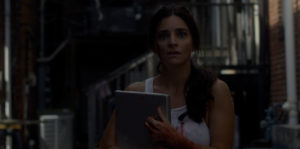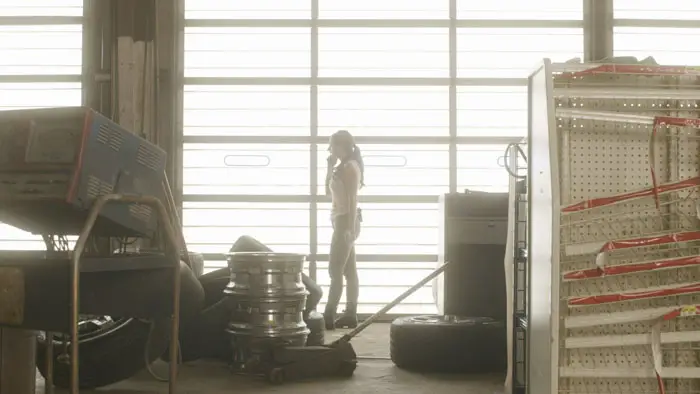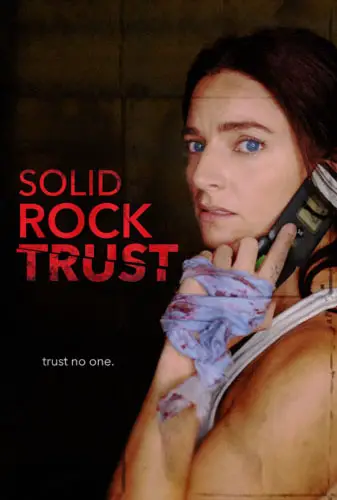
In Solid Rock Trust, writer/director Rick Ives puts a twist on the heist thriller by turning the action from the team on the ground to the man…woman in the chair.
Solid Rock Trust opens in an abandoned and dilapidated office space where accomplished hacker Maddie (Koko Marshall) sits in front of an elaborate computer terminal and a bank of cell phones. The target is the Solid Rock Trust financial institution, and it’s primed for robbing. Her team consists of her former lover Rowen (Alexander Hearth), gunman Carman (Mikaela Moore), safecracker Anvil (Tay Jones), and rookie Boomer (Vinh Nguyen).
The plan is simple. Break into the bank, open the vault, and steal the money. It’s also complicated in that this is not the actual job, and Maddie has much bigger plans for the crew as the bank holds the cash for the multi-state lotteries, and she plans to hack the bank’s private servers and distribute the funds to hundreds of accounts around the globe.
In running the heist, Maddie communicates with each team member under a different identity…and accent. This way, if anyone is caught, they only have part of the plan and a fake identity for Maddie. Yet, her plan begins to fall apart when Carmen becomes suspicious of Maddie, thinking they are there for the cash and not the servers.
Before you know it, the alarms are tripped, forcing Maddie to adjust, but the question is whether someone on her team is trying to sabotage the heist. Also, assigned negotiator Officer Waters (Willie Davis) is slowly starting to unravel Maddie’s plan and her identity.

“…plans to hack the bank’s private servers and distribute the funds…”
As mentioned above, Solid Rock Trust takes place entirely in Maddie’s makeshift lair. As Maddie, Koko Marshall is on screen the entire time and up to, carrying most of the film’s weight on her shoulder.
What Marshall does so well is not only reciting the dialogue on writer/director Ives’ script but portraying the nuance of that dialogue as it pertains to the story’s ever-building tension. She not only has to change accents on a dime but manages the varying trust levels she has with her team. Then she deals with the precise nature of the heist itself against the time pressure of the police closing in.
Overall, I’ll say this. There’s an appreciation I have for Solid Rock Trust in using the gimmick of the person in the chair to bring to the screen a thriller and director Ives using every trick in the book to pull it off—computer screens with code flying by, a digital counter, and off-screen voices driving the tension.
For the most part, the gimmick works, but sometimes it feels like it’s hanging by a thread and could come crashing down at any point. By that, I mean there are times when the gimmick feels like it is covering up the fact that the film’s budget is tight. Also, at times, the phone conversations don’t always feel natural to the events as they happen but as voiceovers for a film.
Lastly, Maddie is painted as a Robin Hood type to help build sympathy for her in the end, which seems to come across as a trope that’s hard to buy at times. When people do dark things for good reasons, I really want to see that struggle between right and wrong. I want to see them forced to compromise their values and what that does to a person.
Ultimately, Solid Rock Trust is a solid indie-thriller. Rick Ives does more right than wrong, and Koko Marshall is more than up for the task of being the solitary figure in the film and the woman in the chair.
For screening information about Solid Rock Trust, visit the Flash Bulb Films’ official website.

"…turning the action from the team on the ground to the man...woman in the chair."


